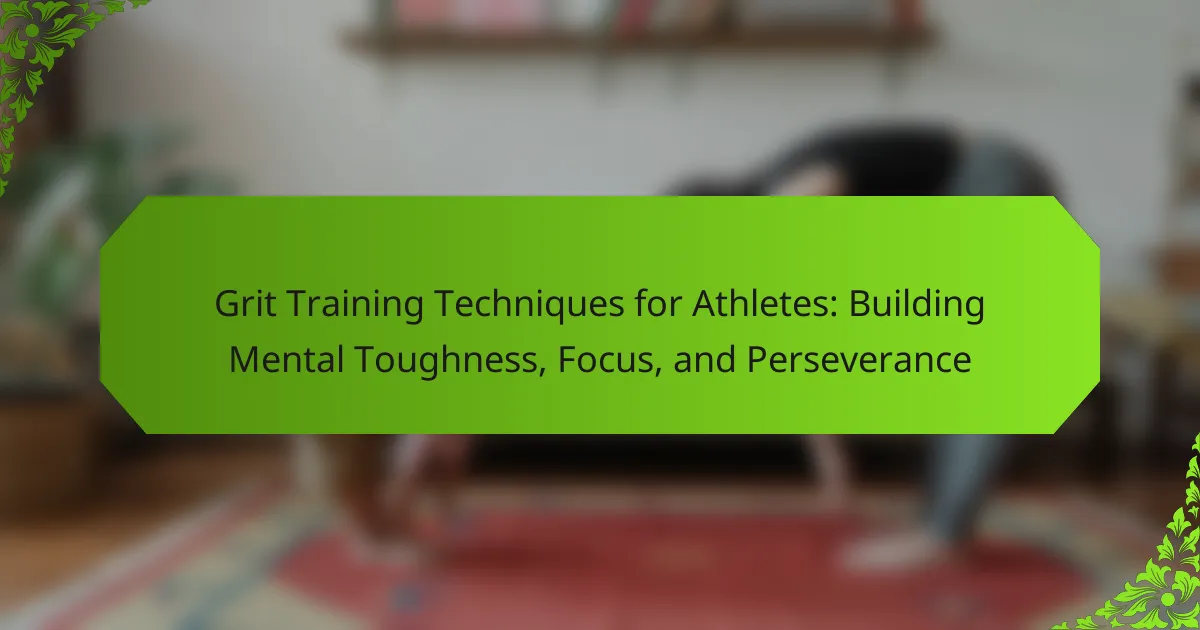Grit development is crucial for amateur athletes aiming to enhance their mental toughness, focus, and perseverance. This article explores the significance of grit in sports performance, the traits that contribute to resilience, and effective practices for fostering these attributes. It also highlights the importance of adaptability, emotional regulation, and intrinsic motivation in achieving sustained success. Lastly, practical strategies will be discussed to help athletes build grit through consistent training and goal setting.

What is Grit and Why is it Important for Amateur Athletes?
Grit is essential for amateur athletes as it fosters mental toughness, focus, and perseverance. Developing grit leads to improved performance and resilience in the face of challenges. Studies show that grit correlates with success in sports, highlighting its importance in training and competition. Athletes with higher grit levels are more likely to persist through difficulties and maintain motivation over time. This unique attribute differentiates successful athletes from those who may give up easily.
How does Mental Toughness Influence Athletic Performance?
Mental toughness significantly enhances athletic performance by fostering grit, focus, and perseverance. Athletes with strong mental resilience can better manage stress, maintain motivation, and recover from setbacks. Research indicates that mentally tough athletes often outperform their peers due to their ability to remain composed under pressure. This unique attribute of mental toughness allows for improved decision-making and sustained effort during competitions. As a result, amateur athletes can benefit greatly from developing these mental skills to elevate their performance levels.
What Role Does Focus Play in Achieving Athletic Goals?
Focus is crucial for amateur athletes in achieving their goals, as it enhances mental toughness and perseverance. A strong focus allows athletes to concentrate on training, improve performance, and overcome challenges. Research indicates that athletes with high levels of focus exhibit better resilience and consistency in their efforts. Developing this skill can lead to significant improvements in athletic performance, highlighting the importance of mental discipline in sports.
How Can Perseverance Lead to Long-Term Success in Sports?
Perseverance is essential for long-term success in sports as it fosters resilience and determination. Amateur athletes who cultivate grit develop mental toughness that enables them to overcome challenges. This mental strength enhances focus, allowing athletes to push through adversity and maintain commitment to their goals. Research indicates that athletes with higher levels of perseverance are more likely to achieve sustained performance improvements and reach competitive milestones. By prioritising grit development, amateur athletes position themselves for lasting success in their sports careers.

What are the Universal Traits of Resilience in Sports?
Resilience in sports is characterized by grit, focus, and perseverance. These universal traits enable amateur athletes to overcome challenges and maintain performance under pressure. Grit involves sustained effort and passion for long-term goals. Focus allows athletes to concentrate on tasks despite distractions. Perseverance is the ability to persist through difficulties, ensuring continuous improvement and success. Developing these traits fosters mental toughness essential for competitive environments.
How Do Amateur Athletes Develop Emotional Resilience?
Amateur athletes develop emotional resilience through consistent practice, goal setting, and positive self-talk. These strategies enhance grit, enabling athletes to overcome challenges and maintain focus.
Regular training fosters mental toughness, as athletes learn to push through discomfort and setbacks. Setting achievable goals creates a sense of purpose and direction, reinforcing perseverance. Positive self-talk serves as a powerful tool, helping athletes manage stress and maintain confidence during competition.
Research indicates that emotional resilience significantly impacts performance. Athletes who cultivate this trait are more likely to handle pressure effectively and rebound from failures.
Incorporating mindfulness practices can further enhance emotional resilience. Techniques such as meditation or visualization allow athletes to stay grounded and focused, promoting a strong mental state during high-stakes situations.
What Techniques Foster Mental Endurance During Training?
Mental endurance during training can be fostered through techniques like visualization, goal setting, and positive self-talk. These methods enhance focus and perseverance, crucial for grit development in amateur athletes. Visualization helps athletes mentally rehearse success, improving confidence and performance. Goal setting provides clear objectives, motivating consistent effort and progress. Positive self-talk combats negative thoughts, reinforcing resilience. Incorporating these techniques builds mental toughness, empowering athletes to overcome challenges and maintain focus during demanding training sessions.

What Unique Practices Enhance Grit Among Amateur Athletes?
Unique practices that enhance grit among amateur athletes include setting specific, achievable goals, fostering a growth mindset, and developing resilience through adversity. These practices cultivate mental toughness, focus, and perseverance. For example, athletes who regularly reflect on their progress and learn from setbacks demonstrate increased grit. Incorporating visualization techniques can also strengthen commitment to goals. Engaging in supportive communities further reinforces perseverance, as shared experiences motivate individuals to push through challenges.
How Can Visualization Techniques Improve Focus and Grit?
Visualization techniques enhance focus and grit by creating mental clarity and reinforcing goals. These techniques allow amateur athletes to mentally rehearse performance, which boosts confidence and resilience. Studies show that visualization can improve concentration and reduce anxiety, leading to better perseverance during training and competition. Engaging in regular visualization practices can help athletes develop a unique attribute of mental toughness, essential for overcoming challenges.
What Specific Goal-Setting Strategies Build Perseverance?
Setting specific, measurable goals enhances perseverance in amateur athletes. Focus on SMART goals: Specific, Measurable, Achievable, Relevant, and Time-bound. These strategies encourage athletes to track progress, stay motivated, and develop mental toughness. Regularly reviewing and adjusting goals fosters resilience, allowing athletes to overcome challenges. Incorporating visualization techniques can further strengthen commitment to these goals, reinforcing a growth mindset essential for grit development.
How Can Peer Support Systems Strengthen Grit?
Peer support systems significantly enhance grit in amateur athletes by fostering resilience, accountability, and shared experiences. These systems create a community where athletes encourage each other, share challenges, and celebrate successes, which reinforces mental toughness. Studies show that athletes involved in peer support networks report higher levels of perseverance and focus during training and competition. The unique attribute of peer support lies in its ability to provide emotional backing, which is crucial for developing grit. As a result, athletes are more likely to overcome setbacks and maintain motivation over time.

What are the Rare Attributes of Grit Development?
The rare attributes of grit development for amateur athletes include adaptability, emotional regulation, and intrinsic motivation. Adaptability allows athletes to adjust their strategies in response to challenges. Emotional regulation helps them manage stress and maintain focus during competition. Intrinsic motivation drives them to pursue excellence for personal satisfaction rather than external rewards. These attributes enhance mental toughness, focus, and perseverance, crucial for sustained athletic performance.
How Does Adversity Shape an Athlete’s Grit?
Adversity significantly enhances an athlete’s grit by fostering resilience, focus, and perseverance. Challenging experiences encourage athletes to develop mental toughness, allowing them to push through obstacles. Studies indicate that athletes who face adversity often exhibit a stronger commitment to their goals, demonstrating an increased ability to concentrate during high-pressure situations. This grit is not merely a reaction to challenges but a cultivated attribute that can lead to improved performance and achievement. As a result, overcoming adversity becomes a crucial part of the athlete’s journey, shaping their character and competitive edge.
What Unique Mindset Shifts Contribute to Grit?
Developing a unique mindset contributes significantly to grit in amateur athletes. Key shifts include embracing challenges, fostering a growth mindset, and maintaining a long-term focus.
Embracing challenges encourages athletes to view obstacles as opportunities for growth rather than setbacks. This perspective builds resilience, essential for perseverance.
A growth mindset allows athletes to understand that skills can be developed through dedication and hard work. This belief enhances motivation and commitment to training, reinforcing mental toughness.
Maintaining a long-term focus helps athletes prioritise consistent effort over immediate results. This approach cultivates patience and determination, crucial for achieving long-term goals.
Together, these mindset shifts create a solid foundation for grit, empowering amateur athletes to pursue excellence.

What are Effective Strategies for Building Grit in Training?
To build grit in training, amateur athletes should focus on consistent practice, setting challenging goals, and developing a growth mindset. Emphasising resilience through failure and maintaining a strong support system enhances mental toughness. Incorporating mindfulness techniques can improve focus and perseverance, ultimately fostering grit.
How Can Daily Routines Foster Mental Toughness?
Daily routines can significantly enhance mental toughness for amateur athletes. Consistent practice fosters resilience, focus, and perseverance. Engaging in structured activities cultivates discipline, a root attribute of grit development. For instance, setting specific training goals and adhering to them strengthens determination. As a result, athletes learn to push through challenges and setbacks, reinforcing their mental fortitude. Regular reflection on progress also aids in maintaining motivation and clarity of purpose, essential for long-term success in sports.
What Role Does Reflection Play in Grit Development?
Reflection plays a crucial role in grit development by enhancing self-awareness and fostering resilience. Regular reflection allows amateur athletes to analyse their experiences, identify strengths, and address weaknesses. This process cultivates mental toughness, focus, and perseverance, essential attributes for success in sports. By understanding setbacks and learning from them, athletes can develop a growth mindset, which is a unique attribute linked to grit. Engaging in reflective practices, such as journaling or guided discussions, can significantly improve an athlete’s ability to stay committed to their goals despite challenges.
What Journaling Techniques Can Enhance Self-Awareness?
Journaling techniques like reflective writing and goal setting can significantly enhance self-awareness for amateur athletes. These methods foster mental toughness and focus, essential for grit development. Reflective writing encourages athletes to analyse their thoughts and feelings, promoting deeper self-understanding. Goal setting, on the other hand, provides clear objectives, enhancing perseverance and motivation. Regular practice of these techniques cultivates a growth mindset, crucial for overcoming challenges in sports.
How Can Amateur Athletes Overcome Setbacks?
Amateur athletes can overcome setbacks by developing grit, which enhances mental toughness, focus, and perseverance. Building resilience involves setting clear goals, maintaining a positive mindset, and learning from failures. Embracing challenges fosters growth and strengthens determination. Engaging in regular self-reflection helps athletes assess their progress and adjust strategies. Seeking support from coaches and peers enhances motivation and accountability.

What Common Mistakes Should Athletes Avoid in Grit Development?
Athletes should avoid underestimating the importance of mental preparation. Common mistakes include neglecting recovery, focusing solely on physical training, and setting unrealistic goals. These errors can hinder grit development, leading to burnout and decreased performance. Athletes must prioritise mental resilience, maintain a balanced training regimen, and set achievable milestones to enhance perseverance and focus.
How Can Unrealistic Expectations Undermine Grit?
Unrealistic expectations can significantly undermine grit by leading to discouragement and diminished motivation. When amateur athletes set unattainable goals, they may experience frustration and a sense of failure. This can erode their mental toughness and perseverance, essential components of grit. As a result, the athlete may abandon their training or lose focus on incremental progress. Cultivating realistic expectations fosters resilience, enabling athletes to embrace challenges and persist through setbacks, ultimately enhancing their grit development.
What Are the Pitfalls of Neglecting Mental Training?
Neglecting mental training can severely hinder an amateur athlete’s grit development. Without mental training, athletes may struggle with focus, perseverance, and resilience during competition. This neglect can lead to increased anxiety, poor performance, and a lack of motivation. As a result, athletes may miss opportunities for growth and improvement, ultimately affecting their overall athletic journey. Consistent mental training is essential for cultivating the mental toughness required to overcome challenges and achieve success in sports.

What Practical Tips Can Athletes Implement to Enhance Grit?
To enhance grit, amateur athletes can adopt several practical strategies. Establish clear goals to maintain focus and direction. Develop a consistent training routine to build perseverance. Embrace challenges as opportunities for growth, fostering a resilient mindset. Utilise visualization techniques to strengthen mental toughness and prepare for competition. Seek feedback and reflect on performance to identify areas for improvement, reinforcing commitment to progress.
How to Create a Personal Grit Development Plan?
To create a personal grit development plan, focus on setting clear goals, establishing routines, and tracking progress. Start by identifying specific areas for improvement in mental toughness, focus, and perseverance.
1. Define your objectives: Determine what aspects of grit you want to enhance, such as resilience during challenges or maintaining concentration during training.
2. Develop a daily routine: Incorporate practices like visualization, mindfulness, or journaling to strengthen mental resilience.
3. Set measurable milestones: Track your progress with specific metrics, such as completing a certain number of workouts or overcoming specific challenges.
4. Reflect and adjust: Regularly review your plan to assess what works and make necessary adjustments to stay aligned with your goals.
This structured approach fosters continuous growth in grit, essential for amateur athletes aiming to improve their performance.
What Resources Are Available for Building Mental Toughness?
Resources for building mental toughness include books, online courses, workshops, and coaching. Books such as “Grit” by Angela Duckworth provide insights into perseverance. Online platforms like Coursera offer courses focused on resilience training. Workshops led by sports psychologists enhance practical skills. Additionally, personal coaching can provide tailored strategies for athletes. Each resource supports the development of grit, focus, and perseverance in amateur athletes.
What Expert Insights Can Guide Grit Development?
Expert insights for developing grit in amateur athletes emphasise the importance of mental toughness, focus, and perseverance. Coaches recommend setting specific, achievable goals to foster a growth mindset. Regularly reflecting on progress enhances self-awareness and motivation.
Additionally, incorporating visualization techniques can improve focus and resilience during challenging situations. Athletes should embrace failure as a learning opportunity, reinforcing their commitment to perseverance. Engaging in consistent practice builds both skill and confidence, essential for grit development.



